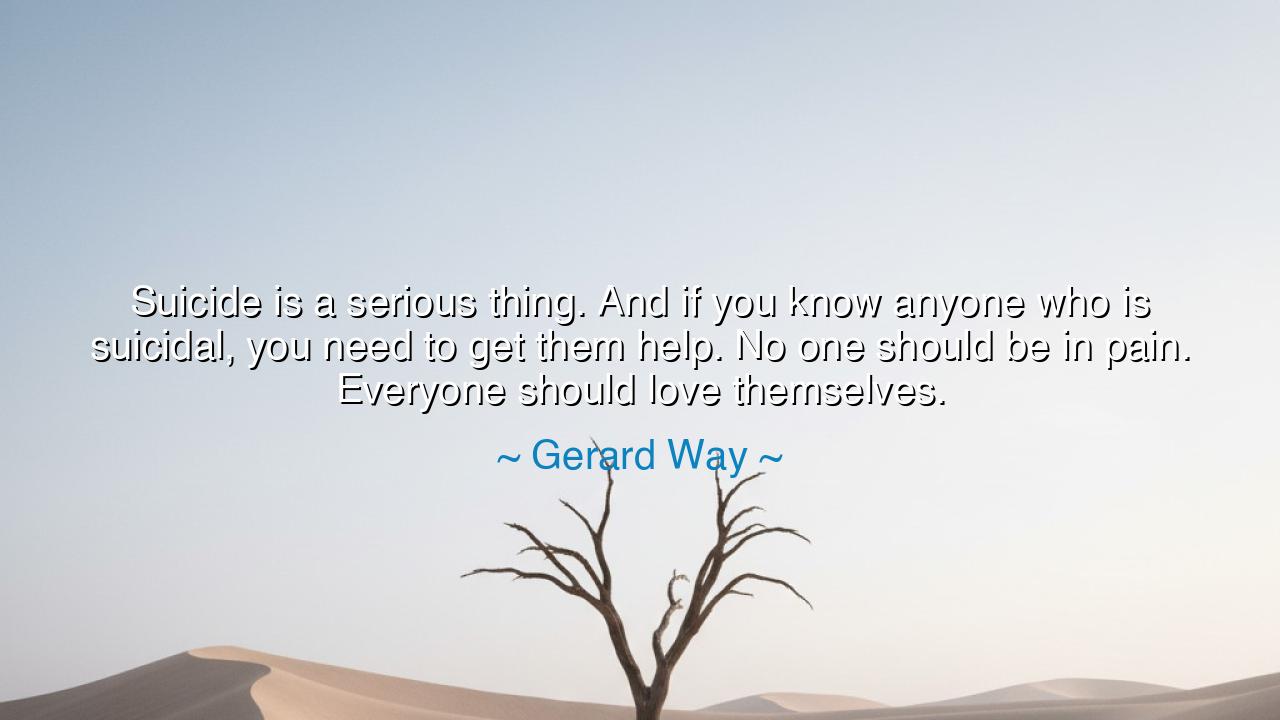
Suicide is a serious thing. And if you know anyone who is
Suicide is a serious thing. And if you know anyone who is suicidal, you need to get them help. No one should be in pain. Everyone should love themselves.






"Suicide is a serious thing. And if you know anyone who is suicidal, you need to get them help. No one should be in pain. Everyone should love themselves." — thus spoke Gerard Way, a musician whose voice carried the cries of a generation, a poet who transformed his own darkness into light for others to see by. In this simple yet profound utterance, he touches the core of the human condition — the sanctity of life, the burden of suffering, and the sacred duty of compassion. For these words are not mere counsel; they are a plea — a call to awaken the kindness within us before despair claims another soul.
When Way speaks of suicide, he does not speak as one untouched by pain, but as one who has walked through its fire and returned with empathy instead of ashes. Like many artists before him, he has witnessed the battle between creation and destruction that rages within the human heart. To him, this struggle is not one to be romanticized or ignored, but to be confronted with tenderness. He reminds us that no pain, however deep, should be faced alone. The act of reaching out — to listen, to hold, to guide — becomes an act of heroism. For the greatest courage is not always found in grand gestures, but in the quiet persistence of those who help others live one more day.
The origin of this truth can be traced to the very soul of human history. From ancient times, the question of life and death has haunted philosophers and prophets alike. The Stoics spoke of enduring pain with dignity; the mystics of every faith whispered that even in darkness, the divine spark remains. Yet Gerard Way’s words speak to our modern world — a world filled with noise but lacking in connection, where people drown in silence surrounded by crowds. His call is not abstract philosophy; it is a cry for community, for the restoration of the human bond. It reminds us that healing begins not in solitude, but in love — the love that reminds each person that they matter, that their existence is a miracle.
There is a story told of Abraham Lincoln, who, before he became one of the greatest leaders of the free world, sank into a deep melancholy so severe that his friends feared for his life. In those dark hours, it was not power or intellect that saved him, but the steady compassion of those who refused to leave his side. They spoke to him, watched over him, and carried his burdens until he could walk again on his own. And from that place of despair, he rose to lead a nation through its bloodiest war — a living testament to the truth that those who are helped in their despair can become beacons for others. So it is with every soul: when rescued from the edge, they often become rescuers themselves.
When Way says, “No one should be in pain,” he speaks not as one denying life’s hardships, but as one affirming that pain should never be endured without compassion. Suffering may be inevitable in the human journey, but abandonment is not. We are bound by an invisible covenant to one another — to ease each other’s burdens, to remind one another of worth when the world’s voice turns cruel. The pain of one is the responsibility of all. A single word, a single gesture of understanding, can pull someone from the abyss. And so, he charges us all with the sacred duty of care.
But there is another truth in his words, equally important: “Everyone should love themselves.” This is not a call to vanity, but to survival. To love oneself is to recognize the divine image within — the spark of dignity that no failure, no wound, no sorrow can erase. Self-love is the antidote to despair, for it roots us in the knowledge that we are more than our pain. It is the beginning of healing, and it grows through acts of gentleness toward oneself. To love yourself, even when you feel unworthy, is to defy the darkness. It is to declare, as the ancients did, that light shall not be extinguished.
So let this be the teaching: If you see one who suffers, do not turn away. Speak, reach, and listen, for your voice may be the bridge between despair and hope. And if you yourself are in pain, do not bear it in silence. Seek the company of those who care — for though you may not see it, there are always hearts waiting to help you carry your sorrow. Remember that love, even when faint, is never lost. Every act of kindness, every moment of courage, pushes back the shadows of the world.
And thus, O children of the living, remember the wisdom of Gerard Way: that the struggle for life is not fought alone, that love — for others and for oneself — is both shield and salvation. Let every generation pass this teaching forward: that no pain is beyond healing, no heart beyond hope, and no soul unworthy of love. For as long as compassion endures, death shall never have the final word.






AAdministratorAdministrator
Welcome, honored guests. Please leave a comment, we will respond soon